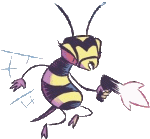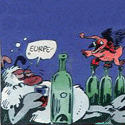|
sean10mm posted:suicide by pepper in 1868 America lol
|
|
|
|

|
| # ? Apr 29, 2024 17:43 |
|
sean10mm posted:Somewhere online I found an old cookbook (1868) with a title like "THE ENTIRE SCIENCE AND ART OF HUMAN FOOD" Ah, so the 19th Century equivalent of "Thai Spicy"
|
|
|
|
Scarodactyl posted:Oh, so a whole third of a teaspoon? Love old 1950s American cookbooks that measure pepper in *grains*
|
|
|
|
sean10mm posted:Somewhere online I found an old cookbook (1868) with a title like "THE ENTIRE SCIENCE AND ART OF HUMAN FOOD"   The antecedent cause of the association between French cuisine and pepper is almost certainly François Pierre la Varenne, whose 1651 Le Cuisinier françois more or less defined the first version of modern French cuisine and (along with la Varenne's other books) held currency until the collapse of the Ancien Régime; he's more or less the dividing line between Renaissance French cuisine which (like medieaval French cooking) was more deeply indebted to Italian cooking than the later cuisines we think of as being quintessentially French. Interestingly, la Varenne, like Escoffier after him, has been subsequently associated with opulence and indulgence, while their innovations were in fact radical simplifications of the cuisines that came before them. Specifically he was instrumental in putting the flavours of local French spices and herbs in a place of prominence in prestige cooking, displacing more costly imported spices from e.g. India and the Far East, which had previously been considered more exotic and therefore desirable. His work is the first time we find the bouquet garni. The first written description of the use of a roux. He may have invented hollandaise. Anyway. His Le Cuisinier françois became, in 1653, the first French cookbook to be translated and made commercially available in English. It introduced a whole slew of French culinary terms into English usage and went through literally hundreds of editions, remaining in print as a standard reference on French cooking in English until the 19th Century. By which time la Varenne's style of cooking had lost its lustre in France as a prestige cuisine, being replaced by e.g. the grande cuisine of Marie-Antoine Carême who, unlike la Varenne before him and Escoffier after, represents a movement toward a more elaborate and ornate style of cooking compared to what preceded it--grande cuisine marked the start of the transition from service à la française (what might be called "family style" serving today--all of the dishes placed on the table at once) to the more theatrical service à la russe (multiple courses served individually). Anyway, Blot is correct that mid-19th Century American French cooking didn't, so far as we know, look much like what was going on at the most expensive tables in Paris at the time. But I think at least part of what we're hearing from him is a hipster or food weeb or whatever complaining that nobody gets France-chan the way he does. Like he's super catty about everyone he disagrees with throughout the text, calling out individual other cookbook authors, for example. This is a fairly common literary style for cookbooks of the time, and I think we should be careful about taking the criticisms at face value. sean10mm posted:Love old 1950s American cookbooks that measure pepper in *grains*
|
|
|
|
Maybe they meant 1/7000th of a pound of pepper.
|
|
|
|
|
It was in reference to ground/crushed red pepper, not peppercorns.
|
|
|
|
sean10mm posted:It was in reference to ground/crushed red pepper, not peppercorns.
|
|
|
|
sean10mm posted:Love old 1950s American cookbooks that measure pepper in *grains* 15.4 grains per gram. I've measures a lot of... stuff... on a reloading scale. 15gr of ground black pepper is a bit more than a half teaspoon.
|
|
|
|
MisterOblivious posted:15.4 grains per gram. I've measures a lot of... stuff... on a reloading scale. 15gr of ground black pepper is a bit more than a half teaspoon. On the other hand calling individual pods of a spice "grains", and specifically with pepper and pepper substitutes (e.g. grains of paradise/Guinea grains and grains of Selim), has a history going back over five centuries. It's again something I wouldn't necessarily expect to find in a cookbook in 1950, but I'd expect a '50s cookbook to rely on a housewife having an apothecary's (or reloader's) scale even less. Like I said, I'd love to know what cookbook it came from, because whichever usage it's definitely an anomaly.
|
|
|
|
Doubleposting, I wonder if the text in question might be Mrs. Lincoln's Boston Cook Book or some later work that quotes it (e.g. the more famous Fanny Farmer Boston Cooking-School Cook Book). It's actually from the 1880s and not the 1950s, but occasionally uses "a few grains of" in the sense of "a pinch of". This is frequently done for salt, black pepper, and cayenne. Instructions involving these same spices (and a few others) only occasionally involve exact measurements and when no measurement is given a minority of the cases (a dozen or so) call for "a few grains" and the majority (somewhere in the neighborhood of 80) tell the reader to add them "to taste". E.g.:  and  These are from the 1884 first edition.
|
|
|
|
Would there even be a difference in the days of corned black powder? Powder was manufactured into discrete balls of material and sieved to a size class. If a cartridge/artillery recipe asked for N 'grains' of powder, would it be asking for a mass measurement or a literal count of that many powder balls? 'grain' as a mass unit is a standardization of a platonic barley kernel, using it for pepper is pretty ambiguous between "mass of pepper equal to mass of that many barley kernels" and "that many pepper kernels", but also probably not that different since barley and pepper have similar densities and berry sizes.
|
|
|
|
Foxfire_ posted:Would there even be a difference in the days of corned black powder? The grains in those loads was a measure of weight not a count of individual grains of black powder. In practice the powder in black powder shooting is, and was, measured volumetricly. You fill a brass tube sized to your gun with the FFg or FFFg powder your gun uses and dump it down the barrel. Charge weight is approximate. (My dad literally had a BATF investigation because he shot so much black powder and still gets selected for "random" checks when flying)
|
|
|
|
MisterOblivious posted:The grains in those loads was a measure of weight not a count of individual grains of black powder. In practice the powder in black powder shooting is, and was, measured volumetricly. You fill a brass tube sized to your gun with the FFg or FFFg powder your gun uses and dump it down the barrel. Foxfire_ posted:'grain' as a mass unit is a standardization of a platonic barley kernel, using it for pepper is pretty ambiguous between "mass of pepper equal to mass of that many barley kernels" and "that many pepper kernels", but also probably not that different since barley and pepper have similar densities and berry sizes. 
|
|
|
|
MisterOblivious posted:
What is BATF and does he just get checked because of that one investigation? I know this is off topic, but im curious.
|
|
|
|
ZombieCrew posted:What is BATF and does he just get checked because of that one investigation? I know this is off topic, but im curious. BATF is the Bureau of Alcohol, Tobacco, Firearms (and Explosives) and there are regulations on the amount of black powder you're allowed to possess at once because, unlike modern smokeless powder, it's relatively easy to turn into explosive devices.
|
|
|
|
There’s a book written by the ministry of the food industry in 1930s Russia called Book of Tasty and Healthy Food, which is basically thinly veiled propaganda about how great the food choices were to glorious Russia. Here is an example of this, where they discuss a place setting for a dinner for a family of 6. 
|
|
|
|
I have a copy of that book! It’s actually very serious about efficiency in cooking. You boil the meat dish to cook it, save the fat for frying the vegetables, and use the broth in the pot to make soup.
|
|
|
|
|
God help you if you don't have government approved herring plate
|
|
|
|
angerbeet posted:God help you if you don't have government approved herring plate Listen. I want to go to this dinner with three different types of booze in one meal. Nuts to the herring plate.
|
|
|
|
Now you made me remember the movie Babette's Feast, and hungry as a result!
|
|
|
|
I mean herring is best with beer and snaps so...
|
|
|
|
Saw this on Twitter https://royalsocietypublishing.org/doi/10.1098/rstb.2020.0086 https://twitter.com/fiona_jordan/status/1394270000471498755
|
|
|
Crossposting from the whisky thread:Carillon posted:So I was watching the Mummy (best version with Brendan Fraser) set in 1928 and they talk about a Glenlivet 12 year. I was curious both if Glenlivet even was putting age statements on their bottles back then, and where I might find out more about what historical products they were actually putting out in '28 Also thinking about it when did distilleries start bottling their own product, I remember vaguely that a lot of whisky was shipped fairly young and it was the end point distributor that would age, bottle, and brand the final product.
|
|
|
|
|
I'm just top of the head posting here, but I've definitely noticed a thing where writers referred to pre-war whiskey with regard to the 1939-1945 war. Like, the whiskey that existed pre-war was definitely much much better than the stuff produced within the war and then the post war stuff.
|
|
|
|
Maybe it's like steel and nuclear testing made it all go to hell https://en.wikipedia.org/wiki/Low-background_steel
|
|
|
|
Pookah posted:I'm just top of the head posting here, but I've definitely noticed a thing where writers referred to pre-war whiskey with regard to the 1939-1945 war. Like, the whiskey that existed pre-war was definitely much much better than the stuff produced within the war and then the post war stuff. Speculation ahead: WWII was a major impulse event that changed agricultural production practices pretty much everywhere that had even semi-modernized agriculture. There were immediate, government-imposed shifts in what was being produced and in what amount (and methods by which it was produced were quickly changed, too). After the war you had companies that had been manufacturing explosives and other industrial chemicals start offering synthetic fertilizers, pesticides, and herbicides. It's probably a rather jarring pallet shift for a lot of foods to move back and forth between agricultural products produced before and after that transition. Bottled sprits (especially whiskeys and other things made from grain staples which were common in the US, Canada, or western Europe) are going to be one of the few things where within-sample quality loss isn't particularly noticeable over time (compared to something like canned foods, beer, or wine). This means that whiskey during the immediate post-war period is going to be one of the few exemplars of pre- versus post- post-WWII agricultural transitions. angerbeet posted:Maybe it's like steel and nuclear testing made it all go to hell Radioactive content is actually used to identify fake pre-nuclear wines.
|
|
|
|
Also food rationing interfering with distillers being able to get good base materials was a thing.
|
|
|
|
Yeah. The biggest thing with scotch is that rationing made it simply impossible to produce any whiskey for most of the war. At this point, single-malt was rarely drank by itself unless you lived in the region of the distillery and it would usually be sold to blenders to make something like Black & White. Scotch distilleries had to make the hard choice of leaving their whiskey to age to an appropriate point to sell for a high price or sell inferior whiskey at a lower price for an immediate influx of cash. The same thing happened with the US in Prohibition. All of the bourbon distilleries needed to distill another batch of product that would age for several years before it could ever make money, and had a limited supply left from before 1920 to sell in the interim. At least with WW2 the American distilleries were able to switch to industrial alcohol production to keep business going. In the case of The Mummy, aged single-malt Glenlivet did exist in the 1920s. It would have been a premium product and most people who weren't wealthy connoisseurs would only drink single-malt if they lived near the Glenlivet distillery. Jonathan would have surprisingly refined taste to be a fan of it.
|
|
|
|
|
angerbeet posted:Maybe it's like steel and nuclear testing made it all go to hell It's posts like this that make love these dead gay comedy forums, if only for the conversations they spark with my husband. Me: hey hon, you ever hear about low-background steel? Mr Dempsey: ... uh, no? Me: so I'm reading GWS and just learned about it, it's pretty wild. [Gives quick summary of why sunken WW1 battleships are valuable to making scientific instruments] Mr D: ... isn't GWS the cooking forum?
|
|
|
|
Well, you don't want to eat radioactive steel, now do you?
|
|
|
|
Nothing tastes as good as being radioactive feels.
|
|
|
|
I knew tasting metal was a symptom of radiation poisoning but I thought it was less straightforward
|
|
|
|
I saw the below tweet and had a look around to find its source. Its supposedly from Calling All Cooks, Telephone Pioneers of America-Alabama Chapter - December 31, 1982. Though I couldnt find a copy to confirm. https://twitter.com/RobertArnol/status/1442118566455635977  On my search I did find a similar book. Pine to Prairie Cookbook, Volume II, Telephone Pioneers of America. C.P. Wainman Chapter #18, November 1982.  Which had the below recipe:  Telephone Pioneers of America is this: https://en.wikipedia.org/wiki/Pioneers,_a_Volunteer_Network Boner M fucked around with this message at 15:52 on Sep 26, 2021 |
|
|
|
Heh, my aunt included a variation on that in our family cookbook. (Yes, my extended family is large enough that we published a cookbook, and if there's ever a second edition there will be a new section on cocktails.)
|
|
|
|
SA forums poster Joan Lewis, regd: Nov 15, 1982
|
|
|
|
I found grandma's recipe box. Mostly stuff from my great aunt. It's a poo poo ton of typewriter recipe cards for wood burning stoves, as well as ancient snippets from newspapers and magazines. I will work on getting this scanned for everyone to enjoy.
|
|
|
|
Boner M posted:I saw the below tweet and had a look around to find its source. Its supposedly from Calling All Cooks, Telephone Pioneers of America-Alabama Chapter - December 31, 1982. My great grandmother had typed this recipe up and included it in her recipe box and it was not noticed by my grandma or mom until the recipe box was passed down to me.
|
|
|
|
Pookah posted:I'm just top of the head posting here, but I've definitely noticed a thing where writers referred to pre-war whiskey with regard to the 1939-1945 war. Like, the whiskey that existed pre-war was definitely much much better than the stuff produced within the war and then the post war stuff. I wonder how that much applies to Scotch. The UK was broke as gently caress after WW2 and was doing its absolute best to sell it to the US for hard currency in the 40s/50s.
|
|
|
feedmegin posted:I wonder how that much applies to Scotch. The UK was broke as gently caress after WW2 and was doing its absolute best to sell it to the US for hard currency in the 40s/50s. There was a serious risk of running out of good scotch during WW2 because rationing was so strict that it simply wasn’t allowed to be distilled, and it takes years to age new product. They had the choice of either selling what they had for cash or trying to sit on it for more future money. The same thing hosed up the US bourbon industry after Prohibition. They were suddenly almost out of good whiskey to sell and had to either sell barely aged crap for immediate money or let it sit around to age.
|
|
|
|
|

|
| # ? Apr 29, 2024 17:43 |
|
Made pastila yesterday and today, currently cooling after assembly and bake. The basic apple marshmallow is really cool stuff but holy hell does it take a long time to make.
|
|
|



































